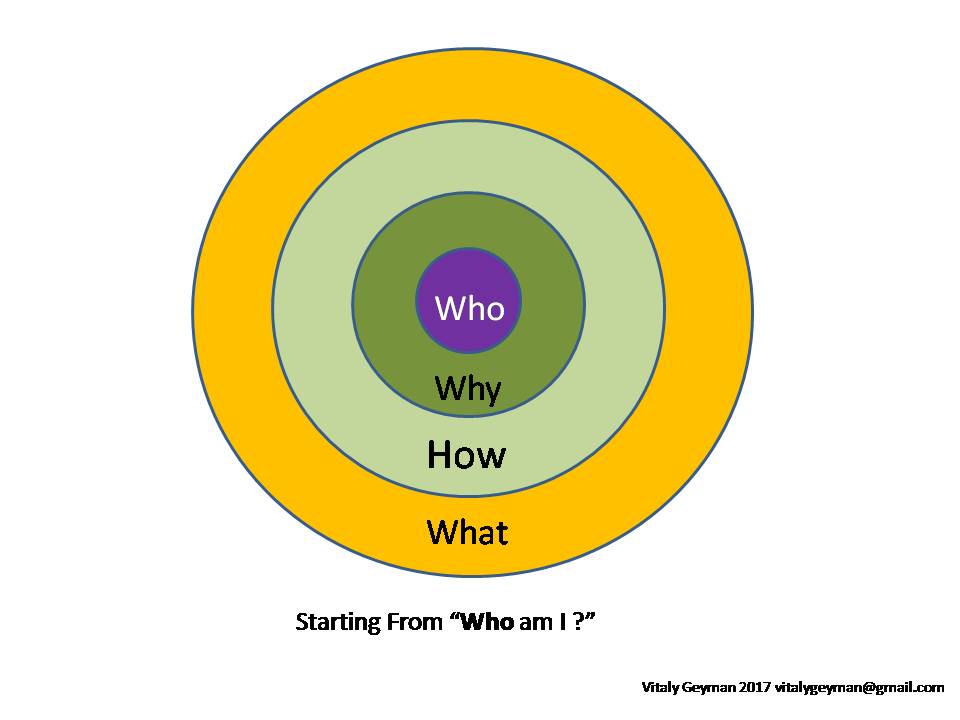In his “Start with Why” model, Simon Sinek elegantly points out that people don’t buy what you sell; they buy the reason you exist as a company. In other words: When a company knows its purpose, it attracts the right customers and inspires its people. It creates a meaningful work environment and builds a purpose-inspired culture.
Purpose-inspired organizations are a major step in the evolution of business. But I feel there is another level beyond the “why” that needs to be uncovered. To explore it, we need to pose an existential question that has been asked by many of our most enlightened thinkers and spiritual leaders. That question is “Who am I?” or “What am I?”

The question is an invitation to explore who we are beyond the physical body-mind instrument and all of the roles with which we identify. It is a question that goes to the core of our being. It’s a type of question that send us deep within, on a journey of self inquiry.
My personal exploration opened up a small window to the answer of this question. From this window, I saw that I am much more than the roles I play during my working and private life. For example, yes I am a coach and consultant, but that is only part of me. I am a husband, but that is only part of me. In reality, none of these roles define me, as I am much bigger and more fluid.
Operating from this knowledge, I develop a broader worldview. I feel more expanded and inclusive. My value-set changes dramatically, and I am naturally more compassionate and sensitive to other people.
Such expanded consciousness also allows us to stay more flexible and adaptive in the organizational setting, which is extremely useful in today’s ever-changing business environment.
The power of “Who am I?” in an organizational context
Imagine an organization where individuals operate from an expanded conscious awareness of who they are, beyond their ego-self. The energy and the power of such a unified field of self-aware individuals is unstoppable.
What are the values of such an organization? How does its “why” change to reflect self awareness? What kind of customers does it attract? What impact does it have on society and our planet?
It’s inspiring to reflect on such questions, as they approach what we all yearn for deep inside.
The epiphany moment
When I closely examine most of my inspirational leaders within organizations and society at large, I realize that many of them have gone through some kind of epiphany moment.
That is, at some time in their lives, they had a major breakdown of their conventional self: a dark night of the soul; a time when they had to question everything in their lives, including who they really are. This moment is often associated with an extreme feeling of disconnection and alienation; it is like they don’t fit into the box anymore. It is typically accompanied by a void, an emptiness, where a person no longer knows where he or she belongs.
I would like to propose that this is where the transformation journey begins both for an individual and an organization. We can call it the beginning of a spiritual awakening — although, from my experience, it certainly does not feel like it at the time.
It is at this moment when those of us who have gone through it ourselves have an opportunity to step in and provide heartfelt support. It is an opportunity for true connection.
Starting from the top
Looking at most of the enlightened leaders in organizations such as Patagonia, Starbucks, Barry Wehmiller, The Body Shop, and so on, it seems that many of them have experienced such moments of awakening.
The question is: Can we truly create a conscious company if the top leaders of the organization have not had a personal awakening?
If the answer is that we cannot, the next question is: Is it possible to facilitate or create an environment within an organizational setting where personal awakening can occur?
I believe we can and we must. It may not be easy as there are not many role models for that, but it has been done. Just take a look at the CEO of Barry Wehmiller, Bob Chapman, who transformed his $2.5 billion enterprise into a shining example of human-centered leadership. It’s now a place where managers are facilitators of personal development, with its own Leadership Institute. There are also numerous small enterprises that created a truly conscious environment to assist in the personal and collective transformation of their workers.
Not all of us are lucky enough to be part of such organizations, and that is why I feel we need to continue supporting individuals within any company who are awakening and looking for answers.
In some cases, they may decide to leave an organization as they feel they no longer belong there. They may even start their own conscious company or become a coach. In others, they may decide to stay and support coworkers who are on the brink of such an awakening. Either way, the more awakened souls there are in the world, the better off we are as a society overall.





